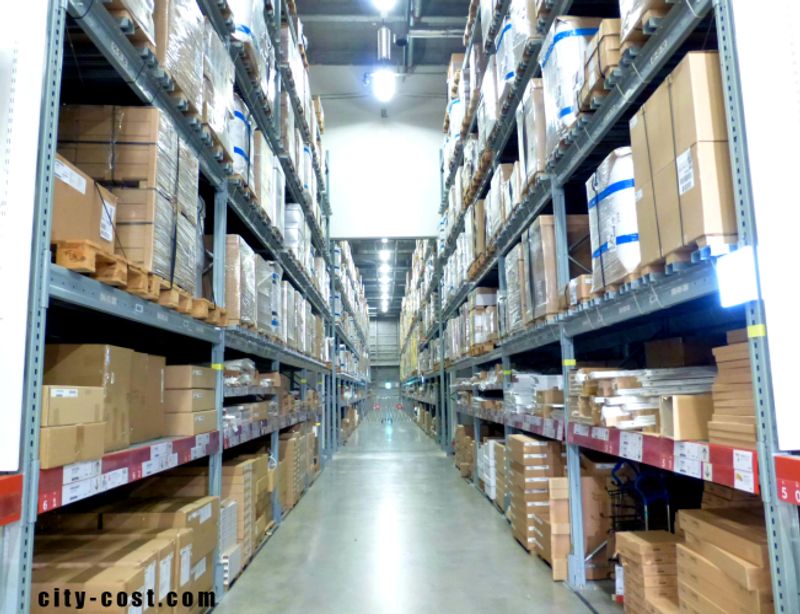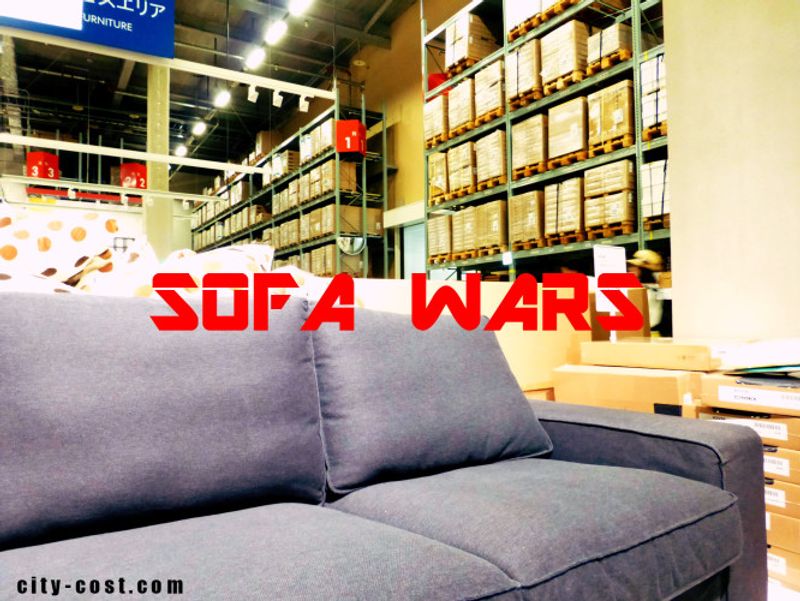Jul 21, 2015
Are You Ready For The Commitment? Buying A Sofa In Japan

You always know that someone has settled into life in Japan when they have a sofa. Given the hassle of getting it up stairs and the lingering doubt of, How the hell am I going to get rid of this thing?!, such items tend to be the preserve of those anticipating a long stay ‘in country’. The rest of us are left to make do with a random collection of bean bags, cushions, and pokey armchairs that may remind us of our student days. Still, at least we’re sure they’ll fit inside our quarters. Plus, they’ll be easy to fob off onto others when we leave.
Of course, if you're feeling ready for the commitment, there's no reason you can't have a sofa to call your own.
Without doubt, the cheapest place to get your backside on a sofa is a secondhand store or recycle shop. The Japanese love stuff that's new. Consequently there is no shortage of such stores, anywhere!
Pros
Price: Cheap, cheap and cheap! One may be able to pick up a reasonable-sized, two-seater for as little as 5,000 yen.
Logistics/Service: The store in question may offer a delivery/installation service. Perfect for those without access to wheels and who would otherwise have to be self reliant in hauling the thing up any stairs.
The store in question may also be interested in buying (or just taking) your 'old' sofa, should you have one!
Cons
If you're trying to fit a new sofa into some sort of 'theme' you've got for your place, going secondhand may mean a lot of shopping around. Selection at recycle shops is, quite frankly, mad! You'll often find yourself thinking, Who thought it was a good idea to buy that?! Well, it could be you, if the price is right!
Quality: OK, so we might expect a few frayed corners and some fading upholstery. We may even be OK with a dubious stain or two. What about longevity/comfort? Don't be surprised if the sponge in your new sofa wilts to nothing more than the equivalent of a well-used kitchen sponge within weeks!
Logistics/Service: Whilst some stores can do delivery/installation/pick up, others may not!

If you fancy yourself above going secondhand but you're yet to be in the custom-made-chaise-longue market segment, you might want to check out Japan's home-furnishing big guns, IKEA and ニトリ (Nitori).
IKEA
There’s a lot to deride about IKEA. The shopping experience is dystopian. That path you’re forced to follow prevents any quick exit from the store, and the Swedish giants are damned if they’ll let you leave without buying anything, even if it’s just a 50 yen ice cream. Despite all this, there are a lot of pros if you’re buying a sofa …
Choice: Safe, simple, clean, not flashy, unpretentious, colors that make sense … . Price and logistics aside, if you can’t find what you’re looking for in IKEA, well, just give up now or shell out extra cash for something custom made.
Price: Bottom end - 30,000 yen for a simple two-seater. Top end - 100,000 yen +. In sales, you may be lucky enough to pick something up for 20,000 yen. Oh, and prices in Japan are cheaper than this writer’s homeland.
Logistics/Service: IKEA can deliver and, if you wish, assemble your sofa within about 3 days (if the item is in stock).
Cons
Price: By no means expensive when it comes to sofas, but, well, a lot more costly than going second hand.
Logistics/Service: Yes, IKEA will deliver. Yes, they’ll assemble. They won’t do this for free though.
Inquire about these services in store: ワンパッケージ配送サービズ/one package haisou service, delivery of one package (990 yen - 3,990 yen depending on size/weight). 商品ピックアップ代行サービス/shouhin pick up daikou service, delivery of up to 20 items (3,990 yen - 7,490 yen depending on delivery distance). 家具組み立てサービス/kagu kumitate service, assembly of items (5,000 yen a time + 20% of item's value).
Location: Compared to ニトリ and secondhand/recycle shops, there is a relative paucity of IKEA. Such is their size, they are usually a little out of town. Here’s where you can find them …
Kohoku (Yokohama), Shin-Misato (Saitama), Kobe, Sendai, Funabashi (Chiba), Tsuruhama (Osaka), Fukuoka, Tachikawa (Tokyo)

ニトリ (Nitori)
Wow, ニトリ must hate IKEA! The latter has come in, all bravado, swagger, and decked out in the latest kit, to sweep Japan clean off its feet. Still, unassuming ニトリ, isn’t without its pros …
Shopping experience: Infinitely less hassle than IKEA. Probably less crowds, fewer kids bouncing off the sofas, and much easier to navigate and, indeed, exit!
Logistics/Service: A big one this; ニトリ will deliver and assemble your purchase, as well as dispose of your old sofa. Free! Usually within 10 days. Now that’s service!
Location: ニトリ stores are far more accessible than IKEA. They’re nationwide and some of them can be found in downtown areas, like this one in Ginza, Tokyo.
Price: Cheaper than IKEA. Expect a fair bit of choice for around 20,000 yen. Smaller two-seaters may go for even less. You’ll struggle to find much for 100,000 yen +.
Cons
Choice: It has to be said, ニトリ sofas lack the style of those in IKEA. Expect colors that cater more to your grandparents, and designs that lack a bit of imagination.
Price: Yes, ニトリ is cheaper than IKEA, but the sofas are just not as nice. If 20,000 yen is all you want to spend, then stay away from the latter. Why? Because, you’ll likely find yourself tempted into breaking your budget!
How the hell am I going to get rid of this thing? Getting rid of your old sofa!
One answer, buy another sofa from ニトリ. Another answer, befriend someone with a car who’s willing to take you around the recycle shops as you try to sell it. Or, post some info about it here at City-Cost, and maybe one of our readers will come and buy it off you.
If none of the above appeal, you’ll need to get the city to come and deal with it.
粗大ごみ/sodai gomi/bulky refuse
Having the city get rid of items like your old sofa will require purchasing a 粗大ごみ処理券/sodaigomi shiori ken. This is a kind of ticket/sticker/receipt for the collection of your large rubbish. You can buy them from convenience stores. Prices may vary depending on city. For this writer, a one-person sofa requires 300 yen. Any larger and it’s 1,000 yen. Once you’ve bought your ticket, things get a little harder. You’ll need to call the city and arrange a time for them to pick it up. Slap your sticker on the sofa and haul it down the stairs. You can leave it somewhere by/inside the entrance to your building for collection.
Most cities have a homepage introducing (in foreign languages) how to get rid of bulky refuse. Calling to arrange a pick up will probably require someone with a decent handling of Japanese.



0 Comments